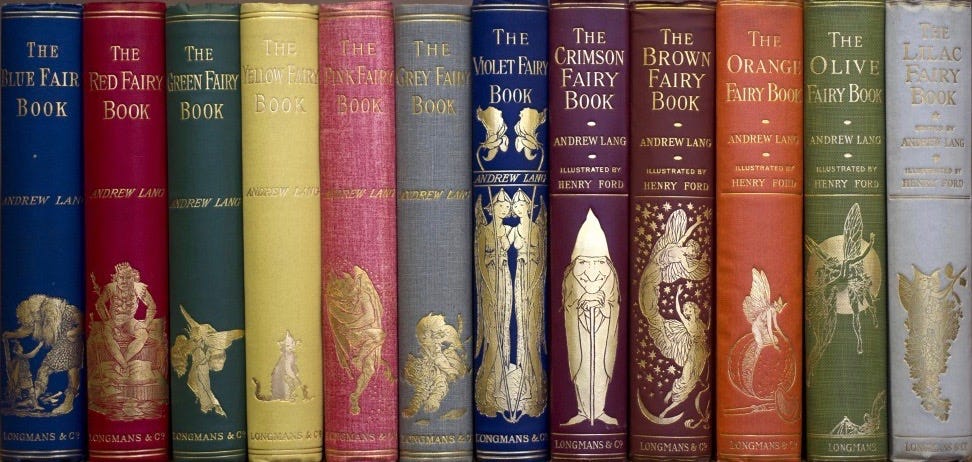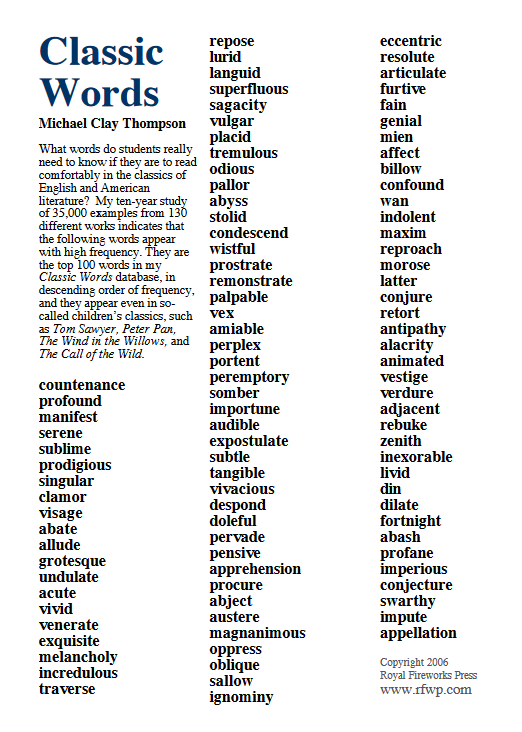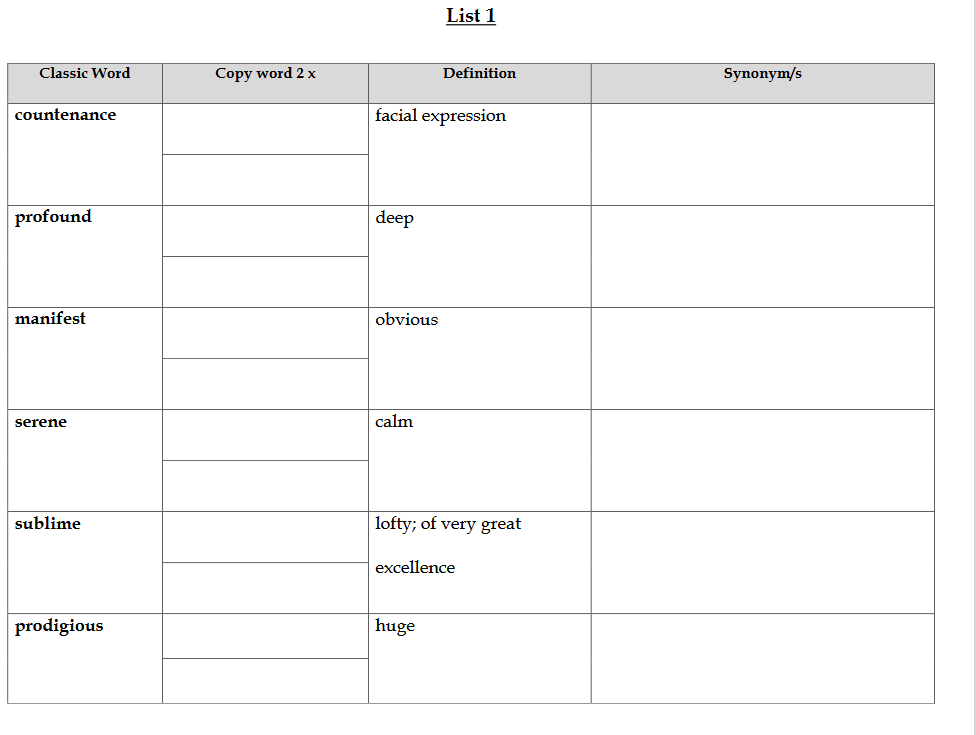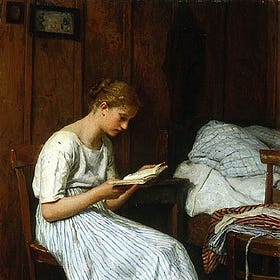G.K Chesterton on Fairy Tales, Essential Classic Words, and Latin/Greek Stems List 4
Happy Friday! This weekly subscriber special is intended to add some extra value for my paying subscribers, and will generally include reading recommendations, stem study to increase English vocabulary (did you know that learning just 100 common Latin / Greek stems gives you access to around 5000 words?), as well as other resources or reflections. Today, I have included a study guide for the top 100 classic words that will give you (or your student) access to countless works of literature.
My main articles will remain free for all readers. Stay tuned for a special post soon!
“The two facts which attract almost every normal person to children are, first, that they are very serious, and secondly, that they are in consequence very happy…
The most unfathomable schools and sages have never attained to the gravity which dwells in the eyes of a baby of three months old. It is the gravity of astonishment at the universe, and astonishment at the universe is not mysticism, but a transcendent common sense.”
G.K. Chesterton, A Defense of Baby Worship
Quotes by G.K. Chesterton never fail to leave me in awe. They capture truth at the core and reveal things to me I didn’t realize I needed to know. In his lifetime, he wrote over 7000 essays including, A Defense of Baby Worship, Negative and Positive Morality, and (one of my favorites) A Piece of Chalk. If you are not yet an avid reader of Chesterton’s, or are still wondering “Who is this guy whose quotes I keep coming across?”, start here . If you would like to delve deeper into his writings, the Society of Gilbert Keith Chesterton has set out a thorough reading plan covering introductory books, apologetics, fiction, essays, literary criticism, poetry and more. If you are interested in some shorter morsels, take a look at their Quotes by G.K Chesterton, which are the best categorized selection I have come across.
Fairy tales, then, are not responsible for producing in children fear, or any of the shapes of fear; fairy tales do not give the child the idea of the evil or the ugly; that is in the child already, because it is in the world already. Fairy tales do not give the child his first idea of bogey. What fairy tales give the child is his first clear idea of the possible defeat of bogey. The baby has known the dragon intimately ever since he had an imagination. What the fairy tale provides for him is a St. George to kill the dragon.
G.K Chesterton, from “The Red Angel” in Tremendous Trifles
Chesterton was an avid advocate of fairy tales and insisted that they provide the foundation from which to teach and understand ethics:
If you really read the fairy-tales, you will observe that one idea runs from one end of them to the other—the idea that peace and happiness can only exist on some condition. This idea, which is the core of ethics, is the core of the nursery-tales. The whole happiness of fairyland hangs upon a thread, upon one thread. Cinderella may have a dress woven on supernatural looms and blazing with unearthly brilliance; but she must be back when the clock strikes twelve. The king may invite fairies to the christening, but he must invite all the fairies or frightful results will follow. Bluebeard’s wife may open all doors but one. A promise is broken to a cat, and the whole world goes wrong. A promise is broken to a yellow dwarf, and the whole world goes wrong. A girl may be the bride of the God of Love himself if she never tries to see him; she sees him, and he vanishes away. A girl is given a box on condition she does not open it; she opens it, and all the evils of this world rush out at her. A man and woman are put in a garden on condition that they do not eat one fruit: they eat it, and lose their joy in all the fruits of the earth.
…It is surely obvious that all ethics ought to be taught to this fairy-tale tune; that, if one does the thing forbidden, one imperils all the things provided.
You can read the complete essay Fairy Tales in its entirety here.
Where to start with fairy tales?
Andrew Lang’s collection of fairy books is a treasure trove to explore. You will find familiar classics, but also countless more obscure tales such as, Why the Sea is Salt, The Mastermaid, The Raspberry Worm, The Bones of Djulung, and The Tale of a Youth Who Set Out to Learn What Fear Was. I never miss an opportunity to pick up a copy of these colourful volumes if I chance upon it at a thrift store, but all the books are public domain and are available for free download on Project Gutenberg.
A helpful editor (thank you David Widger!) indexed all 12 volumes according to popularity and you can download them in various formats for free. Here is an example of The Olive Fairy Book in the online version, which you can copy and paste into a word document for printing. If you are adventurous (and a wee bit patient), you can use this method to help your child compile their very own Fairy Book collection with their favorite choice of colour.
Mastering Essential Classic Words
When embarking on the journey to read classics, many readers feel daunted by the complexity of advanced vocabulary richly peppered throughout older books.
As a second language learner, I recall reading the Hobbit for the first time with a German-English dictionary in one hand, and the novel in the other. I thus have an appreciation for struggling through texts, and an even greater appreciation for the work by educator Michael Clay Thompson, who wondered over 20 years ago what the best words in the English language were.
As an educator who develops language arts curricula for gifted children, Thompson began marking advanced vocabulary in every English language classic that he read, a task which eventually developed into a ten-year study of 35,000 examples from 135 different works. From his research he distilled the top 100 words that appear with high frequency in classic works of English and American literature.
Here is a pdf download of the 100 Classic Words.
This list is profoundly useful and my students have often thanked me for introducing them to these essential classic words. I have developed the following worksheets that help you or your student master the top 100 classic words.
100 Classic Words with Definitions
Here is the list broken into 10 parts with space for you to practice:
This is what the pages look like (as a fan of cursive writing, I always leave space for copying words):
If you are wondering why we should bother with classic books, read my earlier post:
Rehabilitating Ferals of the Digital Age
Latin / Greek Stems List 4
If you are a new paid subscriber, start with Lists 1, 2, and 3 before moving on to the current list. You can access the pdf downloads for List 1 and 2 of the Latin / Greek stems here, and list 3 here.
Here are this week’s pdf downloads for List 4 of the Latin / Greek stems:
Latin / Greek Stems List 4 - Practice
Latin / Greek Stems List 4 - Flashcards
Latin / Greek Stems List 4 - Quiz
Schedule
A suggested schedule for studying the weekly stem lists might look like this:
Day 1: Copy stems, definitions, and examples
Day 2: Review stems with flashcards; write five example sentences
Day 3: Review stems with flashcards; write five example sentences
Day 4: Review stems with flashcards; complete the weekly quiz
If you have young children, you can adjust the weekly schedule. You may want to simply start by introducing two or three stems each week. There is no need for hurry.
Organizing the study of stems in this fashion will ensure continuous review and also offer a sense of accomplishment for your student when looking back over the mastered stems. I have used this method for years with my own students, culminating each term with a mammoth 100-stem quiz. Amazingly, all students who kept up regular study over the term (even just 5-10 minutes a day), had little difficulty attaining a perfect (or near perfect) score.
I hope you are enjoying the resources and would love to hear from you!
Until next week,












Thank you for that post. After reading all the Narnia books to my son I started on Lord of the Rings and surely found the vocabulary a great challenge. I was acually surprized how many words I did not know and found constant interruptions (looking up or explaining a word) quite tedious - especially late in the evening. We abandoned it 2/3 through and started on "The Swiss Family Robinson" - and now I am in the same boat! (I wish I could read it to him in German). I think I will study the lists you kindly made available first myself! Thanks for all the links!